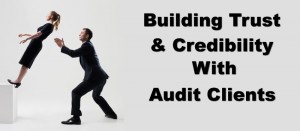In 2007, I found myself working for what would soon become a failed financial institution. That is a nice way of saying that the bank would no longer be in business. I spent the previous 8 or so years in the financial services industry. Unfortunately, internal auditing jobs in the industry were not plentiful in the city where I lived. Grant it, I have experience in several industries, but I was able to truly connect with clients in financial services. For quite some time, I thought I was able to relate because I had some expertise in the industry and could “speak the language”. The next 5 years taught me a lot about my role in the profession of internal auditing and some fundamental truths about working with clients.
I was fortunate enough to find employment before the financial institution went under. I ended up in higher education as the Director of Internal Auditing for a university. I must admit that this is one of the most complex environments I have ever seen with multiple funding sources and varied and complex stakeholder groups. Many of my colleagues would give me a grim smirk or smile when I would say this, but allow me to explain. Many colleges and universities are comprised of functions that represent many industries. For example, my current employer is 16,000 student university with ownership interest in a law enforcement training company and an art museum, a $70 million endowment, over $17 million in contracts and grants, $107 million in financial aid disbursements, 6 dormitory facilities, a state of the art conference center, an aquatic center, a golf course, retail stores, several food venues, grounds keepers, maintenance staff, a fuel station, canoe rentals, a continuing education unit, public debt (bonds), a radio station, television & newspaper, library operations, parking enforcement, transportation services and a police force with sworn officers (I’m sure I have forgotten something in this list…but you get the point).
As you can see, my new position had me bouncing between several industries including hospitality, retail & distribution, quick serve foods, physical facilities, MRO, education, print & digital media, law enforcement, parking, transportation, etc.
As you can imagine, I was quite nervous with my new position and responsibilities. But shortly after I started, I remembered what it really means to be an internal auditor. As auditors, we are not necessarily experts at whatever it is our clients do. We cannot be. We do not perform their tasks every day. We are experts in risk identification, information solicitation, information/process evaluation and reporting the results of the evaluation. If we are good at these fundamental skills, we can succeed as auditors in any environment. To truly succeed, we need good working relationships with our clients. And for that we need to build and maintain credibility. Therefore, I set out to build credibility with my new audit clients. Five years later, I believe I succeeded.
I want to share with you my three stage approach to building credibility with audit clients. You must (1) show how much you CARE about the process (2) BE COLLABORATIVE and (3) COMMUNICATE.
CARE
The first rule of caring is to understand that:
Our clients truly do not care how much we know until they know how much we care.
Auditing is a difficult job. However, being audited is even more difficult. Our clients open up to us and expose themselves. We evaluate what they do and report the results to management. No one likes to be exposed. However, when done in a constructive manner, even the toughest client can appreciate constructive assistance. Here are some of the things you can do to demonstrate how much you care:
- Try to stay abreast of current practices in the industry.
Inquire about specialized industry (or sub group) professional organizations. Consider joining a professional organization and/or attending training alongside your client’s personnel.
Inquire about trade publications relevant to their processes.
Read relevant materials.
Ask clients about emerging trends or any other pertinent industry changes.
Offer assistance. For example, offer to help research a pending change, rule or regulation. - Setup Google alerts for specific topics related to your company, industry or significant organizational processes.
- Check in on clients when you see a news story (i.e. new regulation, etc) that may affect to them.
COLLABORATE
Seek opportunities to partner with clients. In the past, I have attended training seminars with clients, provided fraud presentation/training to client’s staff, participated in their recruitment and interview process, invited them to participate in my recruiting/interview process, etc. After all, everyone is working for the greater good of the organization. If we collaborate effectively, we can make our product or service offering better.
COMMUNICATE
There are many communication books, methodologies and strategies written by people a lot smarter than me. But at the end of the day, I believe people communicate and relate to each other based on what they hear, see and feel. As auditors, we must be mindful of what we say to our clients. It is equally as important to ensure that the words they see in formal communications accurately reflect what we have said to them. But most importantly, we must create an experience with our client that reflects an attitude of caring, competent professionalism.
This approach has worked for me. How do you build and maintain credibility with your audit clients?
If you like this article, tell a friend.
Robert Berry (78)
Robert (That Audit Guy) Berry is a risk, compliance and auditing advocate, educator and innovator. He helps good professionals become better by creating articles, web services and training that allow them to expand their knowledge network.
